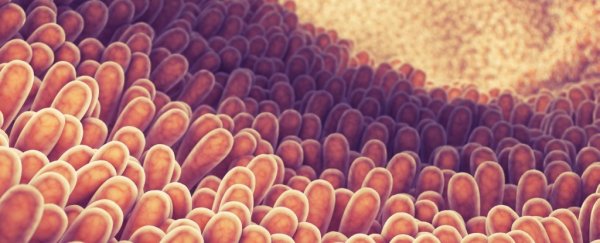Researchers at an artificial intelligence startup have built an algorithm that is scarily good at predicting how many years you've spent on Earth, and the only information it needs is hidden deep within your gut.
The human gut is home to billions of bacteria, from 300 to 500 different strains, containing nearly two million genes - collectively, it's known as the gut microbiome.
But while it's safe to say these living organisms are an important part of our survival, we still don't precisely know what a healthy gut microbiome should look like, or how it changes over time.
The new study, so far available on a pre-print server, adds to a growing body of research that suggests the human gut can serve as a biological clock, capable of pinpointing a person's age within just a few years.
"To our best knowledge, we present the first method to predict human chronological age using gut microbiota abundance profiles," the authors write.
We know that newborns' guts adapt and change in a series of stages. But researchers haven't yet managed to pin down whether the average adult's gut microbiome progresses at all, or whether it stays the same throughout someone's mature life.
It would certainly make sense if the ageing process led to gradual, deleterious changes in the gut; but so far, the science on this is inconclusive, and any age predictions based on this information have been fairly lacklustre.
A past machine model, for instance, was only ten to 15 percent better at predicting whether a sample of gut flora was young or old than a completely random guess.
The new predictions are much more accurate, although we need to keep in mind that they are yet to be peer-reviewed.
To figure out how the microbiome changes over time, researchers from artificial intelligence startup InSilico Medicine examined 3,663 samples of gut bacteria from 1,165 healthy individuals.
The samples, collected from publicly available data sets, came from people between the ages of 20 and 90, with about a third of the data coming from the 20 to 39 age group, a third from the 40 to 59 age group and a third from the 60 to 90 age group.
The team deployed a deep neural network on 90 percent of this data to see if this type of machine learning could end up being able to predict a donor's age.
Once the training was completed, the algorithm was put to the test. When asked to predict the ages of the remaining 10 percent, the program was able to accurately predict someone's age within just four years.
On top of this, the algorithm also highlighted 39 species of gut bacteria that were the most important in predicting someone's age - out of a total of 95 species examined.
Strangely enough, a person's years did not seem to be linked to the number of harmful or beneficial bacteria present in their gut.
For instance, campylobacteriosis, a gastrointestinal infection typically caused by C. jejuni, is known to affect children more often, while older people appear to be more likely to fight these bugs off.
"Older individuals have a lower count of these bacteria, as they are more likely to carry the memory of previous C. jejuni exposure (either in their immune system or microbiota composition) and can effectively prevent its extensive colonisation," the authors explain.
"Meanwhile, younger individuals have not yet tailored the means to oppose C. jejuni and let it multiply to a greater extent."
But the study wasn't really about pinpointing which bacteria promote longevity or lead to more "youthful" gut microbes.
After all, these colonies of bacteria fluctuate with changes in sleep, diet and exercise, so it's difficult to say whether the microbiome changes in the elderly are indicative of ageing, or of changes in global dieting and lifestyle over the past 50 years.
A further investigation of these 39 species of bacteria will be necessary if we want to improve our understanding of human ageing and its relationship to the gut's microbiome.
The authors hope that if their method is verified, it can help create a much more accurate picture of a person's true biological age while they are still alive, possibly leading to advances in personalised medicine.
This study can be found on the pre-print server BioRxiv.
